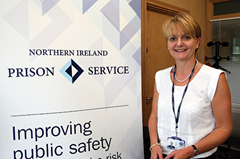Driving change in prisons: Sue McAllister interview
 Northern Ireland Prison Service Director-General Sue McAllister discusses the purpose of prison, pace of reform and the challenges of short sentences with Peter Cheney. The Prison Service has made a good start on reform but a lot of change is still needed.
Northern Ireland Prison Service Director-General Sue McAllister discusses the purpose of prison, pace of reform and the challenges of short sentences with Peter Cheney. The Prison Service has made a good start on reform but a lot of change is still needed.
“If the world was perfect, you wouldn’t need prisons,” Sue McAllister states. “If people didn’t get sick, you wouldn’t need hospitals but the world isn’t like that and people do commit crime. I think prison is important as a last resort for the most serious of crimes and the most serious of offenders.”
Appointed as Director-General of the Northern Ireland Prison Service last May, she succeeded Colin McConnell who is now Chief Executive of the Scottish Prison Service.
McAllister went into the Civil Service straight after university. Three years later, in 1986, she noticed a job advert in the Guardian for assistant prison governors in HM Prison Service (covering England and Wales). Her initial thought was “that sounds interesting” but it was also “a bit of a shot in the dark” as she had no family background or contacts in the Prison Service.
Her posts over the next 25 years included two governorships and working as Head of the Public Sector Bids Unit in the Ministry of Justice, from which she took early retirement in August 2011. A “gap year” then followed before her current post.
Purpose
Public protection, in her view, is the primary purpose of prison: “The need to remove from wider society people who are so dangerous or so problematic that they can’t continue in wider society.”
Depriving them of their liberty is the punishment but she sees no evidence that this, on its own, acts as a deterrent to others or changes the prisoner for the better. Prisoners obviously cannot commit crimes in society while they are locked up. However, if the Prison Service does not work with prisoners, they are “no less likely to re-offend when they go out and possibly even more likely.”
Rehabilitation starts with identifying the factors which explain why an offender became involved in crime. “I genuinely believe that people are not born bad and they’re not born with a propensity to commit crime,” she remarks. “There is very often a link with social deprivation, with chaotic family backgrounds, certainly with poor levels of education, poor levels of literacy and numeracy, and some of the poor social skills that go with all of those things.”
A large number of offenders in Northern Ireland dropped out of school early and education services in prisons help those prisoners to learn reading, writing and basic maths skills so that they can cope with life after release.
The next step is to deal with the ‘criminogenic’ issues through offending behaviour programmes e.g. around anger management, thinking skills or the factors behind sexual offending. Prisoners can also learn about parenting and relationships, cooking and budgeting.
Entering the workforce is particularly hard for ex-prisoners, and more so when jobs are scarce. The Prison Service has been working with Business in the Community and other organisations to explore how to increase opportunities for finding employment.
The best combination for a person leaving prison is to have a house, a job and a friend; the latter role could also be fulfilled by the prisoner’s family, a church or a mentor: “Just somebody to be on that person’s side and help them through what might be some very difficult first days after release.”
Short sentences are a particular challenge as they only give staff “a limited opportunity” to intervene and reduce the risk of re-offending. The re-offending rate for those prisoners is typically much higher and more time is spent on sorting out their immediate needs. Prisoners cannot engage with staff if they are “coming down from drugs or rattling because [they] can’t have a drink.”
It’s important for the Prison Service to be “properly engaged” with other organisations who have already been working with these offenders e.g. the Probation Board, social services and education providers.
McAllister therefore considers community disposals a better alternative than many two- or three-week sentences, and believes that these need to be considered more seriously by politicians.
She has been following the supervised activity orders for fine defaulters which have been piloted in Banbridge and Newry. “In terms of how much engagement you have to do and how much effort you have to make,” she comments, “it’s almost easier to do three weeks in prison than it is to go out there and work on a supervised activity order where you’re doing some form of reparation.” The tax-payer also gets better value for money.
McAllister’s first experience of the Northern Ireland Prison Service came when she sat on Tony Pearson’s review of the death of Colin Bell. The prisoner, who was serving a life sentence for murder, took his life in Maghaberry in August 2008 and the Pearson report (published in June 2009) was highly critical of negligence among staff.
Several of the issues she has come across are similar to those in English prisons. “Perhaps what struck me most in Northern Ireland was that I saw a prison service in the midst of a very significant period of change within a society that was in a very significant period of change,” McAllister adds.
Many officers were being asked to do a job that differed from the one for which they had been recruited and involved more engagement with prisoners and their families. Many staff were “responding positively to that challenge” but others were choosing the exit programme.
“I see three prisons that have done a lot of work to change but that need to do a lot more,” she states. The problems of high sickness levels, costs and poor performance were already outlined in the inspection reports. A new cadre of staff are now coming in and the experienced staff who have chosen to stay on are “up for this challenge.”
McAllister continues: “You can put the new structures in place and you can deliver the training but actually there’s an argument that culture is what people do when you’re not watching them.”
One example of culture change involves working through what ‘decency’ means when talking with prisoners, keeping the prison clean, and allowing prisoners and families to keep in touch. Prisoners should understand that staff should behave in a particular way but equally staff should expect good standards of behaviour from prisoners.
Progress
The change team is in place and the service is under a considerable scrutiny. “For me,” she adds, “change has in some ways been frustrated by the amount of process which exists in the Civil Service here, which I’m coming to terms with.” The appointment of some senior managers has been “slower and more tortuous” than what she had been used to in England and Wales.
That said, the Prison Service has started to complete some recommendations by recruiting new prison officers, allowing others to leave and improving some conditions in prisons. The estate strategy is coming together and the service is awaiting David Ford’s decision on HMP Magilligan.
“This is ‘spend to save’ investment,” she comments. “With better buildings, we’ll be able to deliver a more decent prison service but we’ll be able to deliver it at a fraction of the price.”
The service is also learning from other jurisdictions to avoid ‘re-inventing the wheel’. On the previous day, she had visited Maghaberry with Michael Donnellan, the Director-General of the Irish Prisons Service.
McAllister emphasises that the service needs to “genuinely move towards a service that’s focused on the needs of the offender” i.e. having the right tools to assess the offender and then working with individuals to address those needs. On leaving prison, people should be “much less likely to re-offend but, importantly, much more able to contribute to the communities that they’re going back to.”
Prison officers need the right set of skills to deliver that. The service also has to develop the people who could be the next generation of leaders in the Prison Service. The historic absence of new recruits to “ventilate” the system has led to “some stagnation.”
McAllister counts herself very fortunate to come to the service at a time when the change programme is “well-advanced” and praises the hard work put in before she arrived.
The murder of David Black was a “dreadful event” for the whole Prison Service. A “very small number of people” were planning to join the organisation but decided otherwise “but it has not impacted significantly on our recruitment and training programme.” She adds that this is difficult to measure as people often apply for several jobs at once: “We certainly have been very keen to support the new staff coming in and explain to them the actions that they can do to manage the risks associated with this job.”
Regarding prisoners at risk of suicide or self-harm, McAllister points out that many of them “will have been through the hands of many agencies before they get to us” and prison is, in many ways, the service of last resort.
“We get no credit, nor should we because it’s what our job is, for when we quietly deter people from self-harming or we save people’s lives or we reduce people’s risk,” McAllister states.
“That goes on all the time on every landing in every prison in Northern Ireland. Quite often, you will find a member of staff sitting in a cell with somebody quietly talking to them and actually diverting them from some self-harming behaviour or actions.”
Some officers’ actions have been “indefensible … but it’s a very, very small number of staff” and most officers work quietly and professionally behind the scenes.
Reducing suicide and self-harm, in her view, involves more activity and education so that people are less likely to sit in their cells and dwell on negative thoughts. The service could also work more closely with mental health services in health and social care trusts.
“At a micro-level, we need to be better at managing our own procedures,” she adds. The ‘supporting prisoners at risk’ procedures “are good but we don’t always apply them as consistently or as robustly as we should.”
McAllister strikes an upbeat tone throughout the interview and towards the end, makes clear that she finds the job rewarding. “Obviously, we’re reminded from time to time of the other side of it and the David Black murder did cause some of our staff to question the direction of change,” she adds, “but I think we’ve managed to come through that.”
Practical leadership
“Good, timely, effective, accurate communication” is the difference between success and failure in prisons, Sue McAllister finds. “Most of us will accept things, even if we don’t like them or agree with them, if they’re communicated to us properly and the reasons for decisions are communicated to us properly.” Information was restricted, for good reasons, during the Troubles but it is now important to share that when it is safe to do so.
Sue McAllister has a “fairly practical” style of change management: “Some of it is about making sure that you’ve got a good team around you to support you, and I’m very lucky here in that I’ve got some excellent people and also the opportunity to bring in more people.”
Another aspect is making sure you have the right support outside work. “I’m very fortunate that I’ve got a very supportive family. I’ve got interests outside of this job that mean that it’s not all-consuming.” Everyone likes being able to “tick things off” and it’s important to break a big change programme down into bite-sized chunks.






